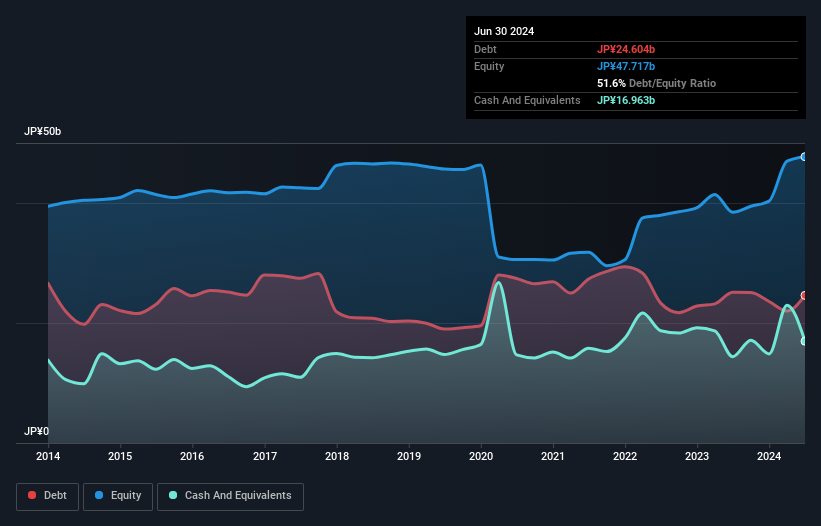We Think KOSAIDO Holdings (TSE:7868) Can Manage Its Debt With Ease
Legendary fund manager Li Lu (who Charlie Munger backed) once said, 'The biggest investment risk is not the volatility of prices, but whether you will suffer a permanent loss of capital.' When we think about how risky a company is, we always like to look at its use of debt, since debt overload can lead to ruin. As with many other companies KOSAIDO Holdings Co., Ltd. (TSE:7868) makes use of debt. But is this debt a concern to shareholders?
What Risk Does Debt Bring?
Generally speaking, debt only becomes a real problem when a company can't easily pay it off, either by raising capital or with its own cash flow. Ultimately, if the company can't fulfill its legal obligations to repay debt, shareholders could walk away with nothing. However, a more frequent (but still costly) occurrence is where a company must issue shares at bargain-basement prices, permanently diluting shareholders, just to shore up its balance sheet. By replacing dilution, though, debt can be an extremely good tool for businesses that need capital to invest in growth at high rates of return. When we think about a company's use of debt, we first look at cash and debt together.
Check out our latest analysis for KOSAIDO Holdings
What Is KOSAIDO Holdings's Debt?
The chart below, which you can click on for greater detail, shows that KOSAIDO Holdings had JP¥24.6b in debt in June 2024; about the same as the year before. However, it also had JP¥17.0b in cash, and so its net debt is JP¥7.64b.

How Healthy Is KOSAIDO Holdings' Balance Sheet?
The latest balance sheet data shows that KOSAIDO Holdings had liabilities of JP¥22.9b due within a year, and liabilities of JP¥7.99b falling due after that. Offsetting these obligations, it had cash of JP¥17.0b as well as receivables valued at JP¥18.5b due within 12 months. So it can boast JP¥4.64b more liquid assets than total liabilities.
This surplus suggests that KOSAIDO Holdings has a conservative balance sheet, and could probably eliminate its debt without much difficulty.
We measure a company's debt load relative to its earnings power by looking at its net debt divided by its earnings before interest, tax, depreciation, and amortization (EBITDA) and by calculating how easily its earnings before interest and tax (EBIT) cover its interest expense (interest cover). This way, we consider both the absolute quantum of the debt, as well as the interest rates paid on it.
KOSAIDO Holdings has a low net debt to EBITDA ratio of only 0.86. And its EBIT covers its interest expense a whopping 83.5 times over. So you could argue it is no more threatened by its debt than an elephant is by a mouse. In addition to that, we're happy to report that KOSAIDO Holdings has boosted its EBIT by 45%, thus reducing the spectre of future debt repayments. When analysing debt levels, the balance sheet is the obvious place to start. But it is future earnings, more than anything, that will determine KOSAIDO Holdings's ability to maintain a healthy balance sheet going forward. So if you're focused on the future you can check out this free report showing analyst profit forecasts.
Finally, while the tax-man may adore accounting profits, lenders only accept cold hard cash. So we always check how much of that EBIT is translated into free cash flow. Happily for any shareholders, KOSAIDO Holdings actually produced more free cash flow than EBIT over the last three years. That sort of strong cash generation warms our hearts like a puppy in a bumblebee suit.
Our View
Happily, KOSAIDO Holdings's impressive interest cover implies it has the upper hand on its debt. And the good news does not stop there, as its conversion of EBIT to free cash flow also supports that impression! We think KOSAIDO Holdings is no more beholden to its lenders, than the birds are to birdwatchers. To our minds it has a healthy happy balance sheet. When analysing debt levels, the balance sheet is the obvious place to start. However, not all investment risk resides within the balance sheet - far from it. For example - KOSAIDO Holdings has 3 warning signs we think you should be aware of.
If you're interested in investing in businesses that can grow profits without the burden of debt, then check out this free list of growing businesses that have net cash on the balance sheet.
Have feedback on this article? Concerned about the content? Get in touch with us directly. Alternatively, email editorial-team (at) simplywallst.com.
This article by Simply Wall St is general in nature. We provide commentary based on historical data and analyst forecasts only using an unbiased methodology and our articles are not intended to be financial advice. It does not constitute a recommendation to buy or sell any stock, and does not take account of your objectives, or your financial situation. We aim to bring you long-term focused analysis driven by fundamental data. Note that our analysis may not factor in the latest price-sensitive company announcements or qualitative material. Simply Wall St has no position in any stocks mentioned.
 Index Options
Index Options CME Group
CME Group Nasdaq
Nasdaq Cboe
Cboe TradingView
TradingView Wall Street Journal
Wall Street Journal